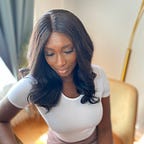The Beauty Queue and Dark Skinned Women as Love Interests
Several times when I have walked down the street with my husband, the visible ire of strangers becomes almost palpable, when they realize that we are a couple. Sometimes, a shadow clouds their faces or a sneer contorts their lips: all manifestations of the ugliness that only racial prejudice can conjure up. Or so I thought.
During the first two years of our relationship, I assumed I was living the universal experience for Black women, in interracial relationships in public spaces. However, over time, as I shared these incidents with my sorority sisters who are also married to white men, but are light skinned; they quickly pointed out that they could not relate to my lived experiences.
I was shocked!
This new found information made me query if interracial love is in itself offensive to the wider community or only when there is a marked difference in the skin color of the couple?
In advertising featuring interracial couples, a brown skinned Black woman with a headful of coily 3C curls, wearing “barely there makeup”, calls to her partner in the other room, who is revealed to be a white man. For advertisers, in the new world, this couple is a nod to brand inclusivity and diversity; however, it further perpetuates colorists ideals in heteronormative pairings.
As the actress, Tika Sumpter remarked some time ago, in an interview on The Real, “It was important for them to show a dark skinned black woman”, as the wife in an interracial relationship on the television show, Mixed-ish. Viola Davis, who appears on the July cover of Vanity Fair, stated during an interview for the film, Widows, “That is, a dark-skinned woman of color, at 53 years old, kissing Liam Neeson. Not just kissing a white man,” she explains, “Liam Neeson, a hunk. And kissing him sexually, romantically.”
These two actresses’ comments speak to the erasure of dark skinned women as primary love objects in romantic narratives in the popular culture. Sadly, it is not only in romance that dark skinned women are sidelined, nor is it only within the Black culture that women of a darker hue are marginalized. As highlighted in a 2016 Time article entitled, The Difference Between Racism and Colorism, “Suffice it to say, one’s health, wealth and opportunity for success in this country will be impacted by the color of one’s skin, sometimes irrespective of one’s racial background.”
Over time, as I have reflected on my own relationships, that of my friends and our current culture, it has become clear that the color of a woman’s skin: how dark or how light, seems to be equated with her worth and her place on the beauty hierarchy. In a racist society, where white women are the embodiment of beauty and womanhood, then its antithesis — a woman with dark skin — would always be at the bottom of this man made totem pole of beauty. Bearing this paradigm in mind, one could extrapolate that it’s only obvious that women who possess dark skin would be deemed less likely to be recipients of love, commitment and adoration, from the opposite sex.
Several years ago, a biracial man that I was dating said his buddy had asked him, ‘Why not date a lighter skinned woman?” instead of me. How was I supposed to respond to that? Why was it even necessary for him to tell me this? I couldn’t provide an answer for him or his friend. Years later, during one of Tino’s visits to Miami, we attended a number of house parties with diverse groups of people. On one occasion, after Tino returned to Germany, a male colleague of Indian ancestry, pulled me aside and exclaimed, “No really…so how did YOU get a guy like that? He’s really handsome…he’s the kind of white guy that only dates hot, white girls.” Maybe, I had used a magic potion, or put a spell on this foreign man.
I was stunned.
Then he added the obligatory, “Well I guess you’re exotic enough.”
These personal anecdotes highlight how deeply held colorist beliefs continue to perpetuate racism within communities of color. Yet, despite my experiences, I have no feelings of victimhood. As more people are beginning to address their experiences with racism and white supremacy, collectively and in therapy; maybe this too, will spark more candid conversations about colorism. Hopefully, people will become more aware of dark skin bias. Hopefully, they will reflect on their colorist beliefs and question how they contribute to these biased standards of beauty.
Read more at https://www.amtaarwellness.com/
